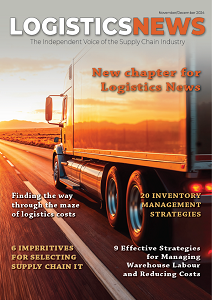Brambles, the global supply chain logistics company operating in more than 60 countries, primarily through the CHEP and IFCO brands, has published its 'Sustainability Review for the 2018 Financial Year (FY18)'.
Pioneering a new way of reporting, this year Brambles has used The International Integrated Reporting Council (IIRC)'s six capitals framework, grouped under financial, manufactured, intellectual, human, social and relationship, and natural capital, to describe the different ways the group creates value in the short, medium and long term.
Brambles help to move more goods to more people, and its purpose is to connect people with life’s essentials by working with manufacturers, suppliers and retailers and overseeing the whole supply chain: from the farm to the factory, from the shop floor to the front door.
The Sustainability Review includes updates on CHEP and IFCO’s sustainability programme and its progress towards its 2020 Sustainability Goals. These goals are based on the company’s Better Business, Better Planet, Better Communities, sustainability programme and are closely aligned with the United Nations’ Sustainable Development Goals (SDGs).
Highlights of the 2018 Sustainability Review include:
- Better Business – Making customers’ supply chains more efficient and investing in a safe, inclusive work environment where our employees can develop. Brambles operate a circular business model, specialising in sharing and reusing unit load equipment with 610 million assets, continuously in motion, across 60 countries.
In FY18, customers’ use of CHEP and IFCO platforms saved 1.7 million trees, 2.6 million metric tonnes of CO2 emissions and 1.4 million metric tonnes of solid waste. Brambles also engaged in collaborative projects with over 240 customers, through its unique transport optimisation programmes, which removed inefficiencies and saved fuel and carbon emissions from the world’s supply chains.
To create a better workplace, Brambles is committed to achieving its goal of Zero Harm. The company made notable progress towards that goal with both the CHEP and IFCO business units improving their safety performance in FY18. - Better Planet – Reducing the environmental impact of Brambles’ own operations.In FY18, 99.4% of the timber used by CHEP came from certified sources with 66.1% carrying complete Chain-of-Custody certification. Brambles also diverted 100% of its plastic waste from its largest managed sites and 89% of its wood waste from landfills. This includes recycling more than 18,600 tonnes of end-of-life plastic materials.
In Europe, reclaimed plastic was recycled into new IFCO reusable plastic crates. Brambles operations also achieved a reduction in carbon emissions per unit to a FY18 accumulated figure of (15.6)% with more than 20% of the electricity it consumed coming from renewable sources. - Better Communities – Positively contributing to the communities in which Brambles operates.Brambles continue its assistance for food rescue organisations, including a commitment to support the Food Bank Leadership Institute (FBLI). The FBLI is a professional development programme that helps nurture the Food Bank leaders of tomorrow.
Brambles create better communities through in-kind equipment donations, financial support and by facilitating volunteering opportunities for employees. All permanent Brambles, IFCO and CHEP employees have access to three days of paid volunteer leave every year. In total, Brambles’ FY18 community investments amounted to US$4,743,000, a 4% increase from FY17.
Brambles’ head of Global Sustainability, Juan Jose Freijo, said: “Following engagement with key stakeholders, we decided to adopt a more integrated method to communicate how Brambles creates value for our customers, our communities and our employees. For example, we can show investors how our circular share and reuse business model maintains our products to their highest value for as long as possible while regenerating the key resources we depend on, and reutilising these materials at end-of-life”.
“Our commitment to sustainability is at the very heart of everything we do. Our pallets, crates and containers form the invisible backbone of the global supply chain. As pioneers of the sharing economy and thanks to our share and reuse model, we have created one of the world's most sustainable logistics business. Together with our partners, we solve shared challenges from fighting food waste to protecting forests. That is how we can make a real contribution to a smarter, more sustainable future”.
Download the Sustainability Review for the 2018 Financial Year (PDF File. Size: 7.35MB)

.png)


